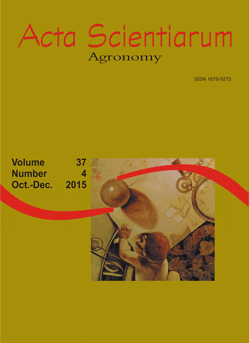<b>Germination and emergence of passion fruit (<i>Passiflora edulis</i>) seeds obtained by self- and open-pollination
Abstract
Seed dormancy is an important adaptive mechanism in many species and is generally lost during plant domestication because of selection that occurs through the collection and planting of seeds. We compared germination and seedling emergence in selfed and open-pollinated progenies obtained from eight passion fruit vines (genotypes). Self-pollination was performed at the button stage to overcome self-incompatibility. The experiment was a randomized block design in a factorial scheme (2 x 8; type of progeny x genotypes) with four replicates and 50 seeds per experimental unit. At 14, 21 and 28 days after sowing, the germination percentage and the emergence speed index were analyzed. The total length of seedlings (cm), shoot length (cm), radicle length (cm) and total dry matter of seedlings (g) were evaluated 28 days after sowing. The mass of 100 seeds (g) was determined before sowing. Differences were noted between genotypes and progeny types with respect to germination and emergence speed. In general, seeds obtained by selfing exhibited earlier germination and a higher emergence speed. It was concluded that seed dormancy is associated with the genotype of the embryo and is most likely conditioned by a dominant genetic effect.
Downloads
DECLARATION OF ORIGINALITY AND COPYRIGHTS
I Declare that current article is original and has not been submitted for publication, in part or in whole, to any other national or international journal.
The copyrights belong exclusively to the authors. Published content is licensed under Creative Commons Attribution 4.0 (CC BY 4.0) guidelines, which allows sharing (copy and distribution of the material in any medium or format) and adaptation (remix, transform, and build upon the material) for any purpose, even commercially, under the terms of attribution.




















































